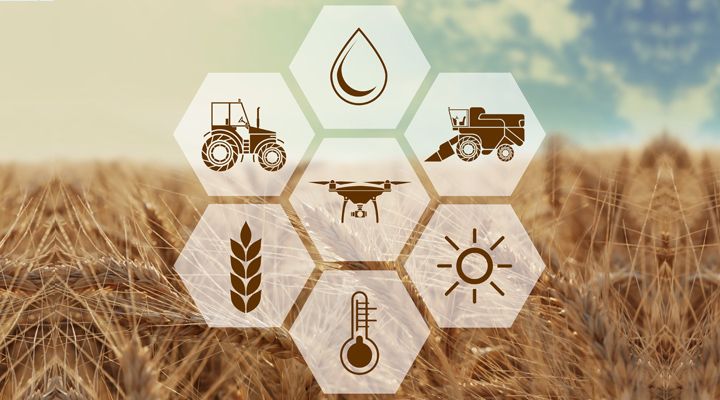
The SmartAgriHubs project enables a broad digital transformation of the European farming and food sector
Gradiant participates with the Galician proposal ‘Digital Innovation Hub for the agri-food sector’, which promotes with Campus Terra
With a €20 million budget co-funded by the European Union, the project aims to build an extensive pan-European network of Digital Innovation Hubs (DIHs)
SmartAgriHubs, started on November 1st, 2018, has the potential to be a real game changer in the adoption of digital solutions by the farming sector. Recent initiatives showed the eagerness of the sector to seize the opportunities offered by ICT, network and data–oriented technologies. However, current available applications are still fragmented and mainly used by a small group of early-adopters.
SmartAgriHubs will leverage, strengthen and connect local DIHs, and 20 000 Competence Centres (CCs) throughout Europe. SmartAgriHubs has already put together a large network of 140 DIHs by building on its existing projects and ecosystems such as Internet of Food and Farm (IoF2020). All DIHs are aligned with 9 regional clusters, which are led by organizations that are closely related to national or regional digitization initiatives and funds. This multi-layer approach is supported by 28 Innovation experiments in which ideas, concepts and prototypes are further developed and introduced into the market.
Gradiant, together with Campus Terra of the University of Santiago de Compostela (USC) and with the support of AGACAL, launched in 2016 the Digital Innovation Hub for the agri-food sector in Galicia with the aim of promoting digitalization in the sector. On the start of the SmartAgriHubs project, Luis Pérez Freire, executive director at Gradiant, explains that “thanks to the presence in this kind of initiatives, Galicia has established itself as a European leader in the area of agri-food digitalisation and the development of digital innovation hubs”. He adds that “our participation in SmartAgriHubs will boost the adoption of digital technologies by the primary sector of our region, and at the same time, it will offer a privileged platform from which to face the future of an agri-food sector that faces numerous challenges”.
More than 2 million farms are expected to be involved through 4000 experiments, bringing the process of digitization closer to the specific needs of the farmers. Demystifying digitization is vital to the project, helping farmers and their businesses to achieve real and attainable results.
A multi-stakeholder approach
SmartAgriHubs brings together different expertise and involves a broad value-chain network covering all EU member states. The consortium includes a vast network of start-ups, SMEs, business and service providers, technology experts and end-users. End-users from the agri-food sector are at the heart of the project and the driving force of the digital transformation.
“Combining a ‘bottom-up’ approach, a close collaboration between private and public sectors, the light work structure and the alignment to regional strategy of specialization are the basis of our success” point the leaders of the Galician digital innovation hub, an initiative that has been praised by the European Commissioner for Agriculture and Rural Development, Phil Hogan.
Strong focus on communication, training and stakeholder engagement
SmartAgriHubs aspires to create an interconnected ecosystem where stakeholders work together in the different phases of innovation from early research to application on farms. Therefore, promoting stakeholder dialogue and providing timely information on progresses and achieved results lies at the heart of the project’s communication activities. To involve, train and inform its audience, several tools will be put in place by the consortium throughout the duration of the project. For instance, in the innovation portal information will be easily accessible by farmers and their businesses, creating an effective, efficient and satisfactory user experience. A catalogue for farmers and agribusiness is also foreseen, mapping the existing digital technology field, to exchange best practices among the network.
George Beers, Project Manager at Wageningen University & Research and SmartAgriHubs Project Coordinator: “SmartAgriHubs will not only increase the competitiveness and sustainability of Europe’s agri-food sector. It will become the 4th industrial revolution that will strategically re-orient the digital European agricultural innovation ecosystem towards excellence and success. Together with our partners we believe SmartAgriHubs will unlock the potential of digitization by creating a pan-European network of Digital Innovation Hubs, organizing an inclusive ecosystem around them and fostering them to achieve their full innovation acceleration capacity.”
Key facts at a glance:
- Instrument: Horizon 2020, DT-RUR-12-2-18: ICT Innovation for agriculture
- Contribution of the European Union: €20 million
- Duration: 4 years, 2018-2022
- Consortium: 108 initial partners, possibility to extend through open calls
- 140 digital innovation hubs, 9 regional cluster & 28 flagship innovation experiments
- Bridge public-private funding by mobilising additional funding (30 M€)
- Strong focus on establishing a sustainable network of DIHs with viable business models and investment funds


